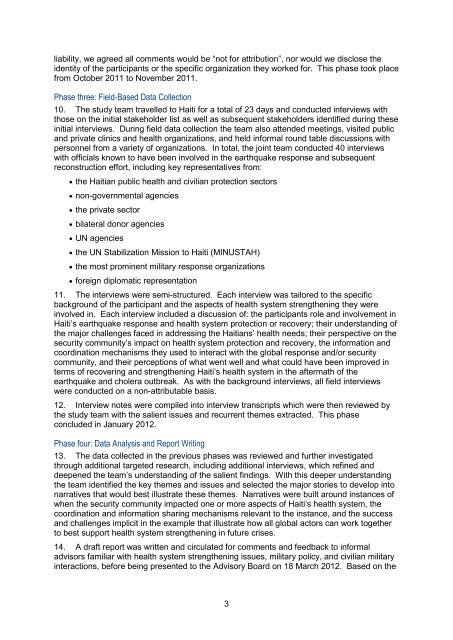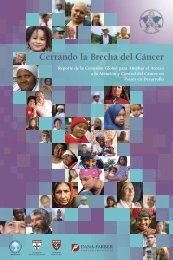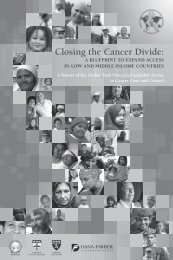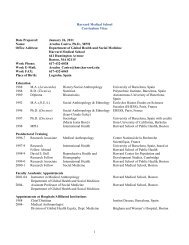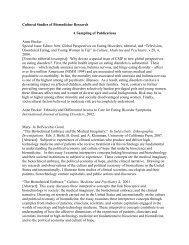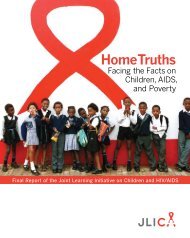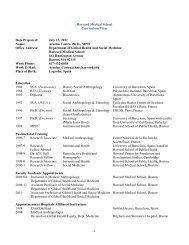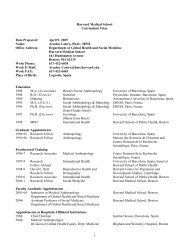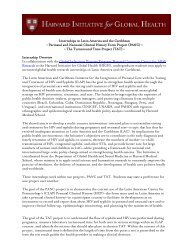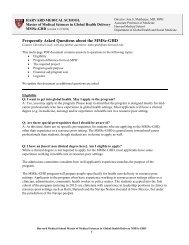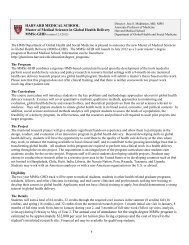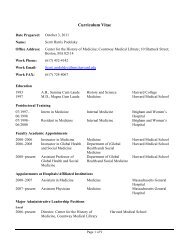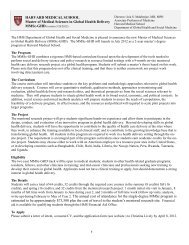Haiti Case Study - The Department of Global Health and Social ...
Haiti Case Study - The Department of Global Health and Social ...
Haiti Case Study - The Department of Global Health and Social ...
You also want an ePaper? Increase the reach of your titles
YUMPU automatically turns print PDFs into web optimized ePapers that Google loves.
liability, we agreed all comments would be “not for attribution”, nor would we disclose the<br />
identity <strong>of</strong> the participants or the specific organization they worked for. This phase took place<br />
from October 2011 to November 2011.<br />
Phase three: Field-Based Data Collection<br />
10. <strong>The</strong> study team travelled to <strong>Haiti</strong> for a total <strong>of</strong> 23 days <strong>and</strong> conducted interviews with<br />
those on the initial stakeholder list as well as subsequent stakeholders identified during these<br />
initial interviews. During field data collection the team also attended meetings, visited public<br />
<strong>and</strong> private clinics <strong>and</strong> health organizations, <strong>and</strong> held informal round table discussions with<br />
personnel from a variety <strong>of</strong> organizations. In total, the joint team conducted 40 interviews<br />
with <strong>of</strong>ficials known to have been involved in the earthquake response <strong>and</strong> subsequent<br />
reconstruction effort, including key representatives from:<br />
• the <strong>Haiti</strong>an public health <strong>and</strong> civilian protection sectors<br />
• non-governmental agencies<br />
• the private sector<br />
• bilateral donor agencies<br />
• UN agencies<br />
• the UN Stabilization Mission to <strong>Haiti</strong> (MINUSTAH)<br />
• the most prominent military response organizations<br />
• foreign diplomatic representation<br />
11. <strong>The</strong> interviews were semi-structured. Each interview was tailored to the specific<br />
background <strong>of</strong> the participant <strong>and</strong> the aspects <strong>of</strong> health system strengthening they were<br />
involved in. Each interview included a discussion <strong>of</strong>: the participants role <strong>and</strong> involvement in<br />
<strong>Haiti</strong>’s earthquake response <strong>and</strong> health system protection or recovery; their underst<strong>and</strong>ing <strong>of</strong><br />
the major challenges faced in addressing the <strong>Haiti</strong>ans’ health needs; their perspective on the<br />
security community’s impact on health system protection <strong>and</strong> recovery, the information <strong>and</strong><br />
coordination mechanisms they used to interact with the global response <strong>and</strong>/or security<br />
community, <strong>and</strong> their perceptions <strong>of</strong> what went well <strong>and</strong> what could have been improved in<br />
terms <strong>of</strong> recovering <strong>and</strong> strengthening <strong>Haiti</strong>’s health system in the aftermath <strong>of</strong> the<br />
earthquake <strong>and</strong> cholera outbreak. As with the background interviews, all field interviews<br />
were conducted on a non-attributable basis.<br />
12. Interview notes were compiled into interview transcripts which were then reviewed by<br />
the study team with the salient issues <strong>and</strong> recurrent themes extracted. This phase<br />
concluded in January 2012.<br />
Phase four: Data Analysis <strong>and</strong> Report Writing<br />
13. <strong>The</strong> data collected in the previous phases was reviewed <strong>and</strong> further investigated<br />
through additional targeted research, including additional interviews, which refined <strong>and</strong><br />
deepened the team’s underst<strong>and</strong>ing <strong>of</strong> the salient findings. With this deeper underst<strong>and</strong>ing<br />
the team identified the key themes <strong>and</strong> issues <strong>and</strong> selected the major stories to develop into<br />
narratives that would best illustrate these themes. Narratives were built around instances <strong>of</strong><br />
when the security community impacted one or more aspects <strong>of</strong> <strong>Haiti</strong>’s health system, the<br />
coordination <strong>and</strong> information sharing mechanisms relevant to the instance, <strong>and</strong> the success<br />
<strong>and</strong> challenges implicit in the example that illustrate how all global actors can work together<br />
to best support health system strengthening in future crises.<br />
14. A draft report was written <strong>and</strong> circulated for comments <strong>and</strong> feedback to informal<br />
advisors familiar with health system strengthening issues, military policy, <strong>and</strong> civilian military<br />
interactions, before being presented to the Advisory Board on 18 March 2012. Based on the<br />
3


